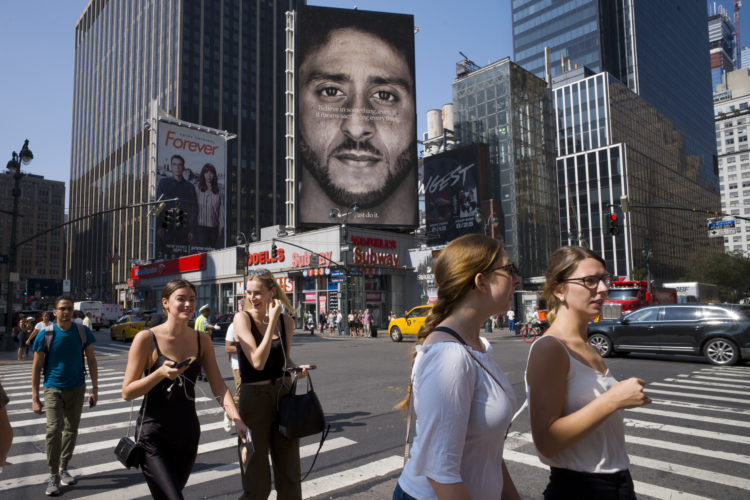The Nike ad featuring Colin Kaepernick may have stirred some controversy, but when you break down the demographics and their markets it isn’t nearly a controversial business decision as many have made it out to be. This was a no risk-free marketing campaign for Nike, regardless of the negative backlash, and here is why.
Nike is a global apparel company worth over $130 billion in market cap with markets all over the world. Nike is also one of the planet’s most recognizable brands with the memorable “Just Do It” slogan recognized worldwide. It also has powerful celebrity athlete endorsements, notably by Lebron James and Serena Williams.
Recently Nike has received a lot of backlash, especially from more conservative-leaning Americans who feel that their latest ad campaign to celebrate their 30th anniversary of the “Just Do It” campaign is improper. The ad has had media buzzing about whether or not it was the correct choice, considering the expected controversy. The ad has, because of its political undertones, given this commercial a lot of free publicity, but there are some questions which need to be addressed on both sides of the debate.
Why did Nike decided to do this? Given that they surely would have known about the large backlash from the polarizing debate about whether “taking a knee” before an NFL game is appropriate to display your First Amendment rights?
Oddly enough, Nike seems to be playing both sides of the debate as they have signed Kaepernick for an endorsement deal, but they also have a deal with the NFL until 2028, so while Kaepernick is accusing the NFL of collusion to keep him out of the NFL, they have a deal with the company, so Nike is making money from both the NFL and Kaepernick.
A few points which the mainstream media has missed on why they have put out this ad:
First, millennials are soon to be the largest demographic group within the United States and they seem to be slightly divided whether kneeling before an NFL game is an acceptable use of First Amendment rights. The backlash and controversy were undoubtedly part of this marketing campaign as the media picked up on this even before the ad ever ran, giving them tens of millions of dollars in free publicity. To be sure, not all publicity is good, much of it was bad, but when you start to break down the demographics any negative backlash most likely will not hurt the big market. Even if it does, if you look long-term at where we as a country are going demographically, it most likely will not be a major concern for Nike. Many millennials are sympathetic to why Kaepernick took a knee. This ad was designed to appeal to a millennial. Taking this into consideration, there really wasn’t much risk, business-wise, in doing this ad. It will solidify their standing with the millennial generation with massive publicity from news outlets showing their ad for free.
Second, the majority of Nike’s business is outside the United States, with 58 percent of their 2017 revenue coming from abroad. Sales in China are huge and surging compared with the company’s stagnant growth domestically. They may have some issues with the trade war with China, but take all of these and combine them and the ad starts to make a little more sense.
To conclude, Nike’s core US customer base most likely will not be affected by the ad in the long-term, their superstars such as Lebron James and Serena Williams have voiced support of Kaepernick, so there is no danger on that front. The majority of their revenue comes come from overseas markets, China being the bright spot. Nike headquarters is located in Portland, Oregon, which has gained somewhat of a reputation for being very anti-Trump, so take all of these into consideration and the ad starts to appear as a well-calculated marketing strategy.
As a disclaimer: I own no Nike shares nor shares of any of their competitors.
Already have an account? Sign In
Two ways to continue to read this article.
Subscribe
$1.99
every 4 weeks
- Unlimited access to all articles
- Support independent journalism
- Ad-free reading experience
Subscribe Now
Recurring Monthly. Cancel Anytime.











COMMENTS